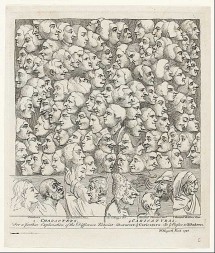The Road to Character

Hogarth's Character Caricatures
(By David Brooks) (2015)
SBS Australia used to broadcast the Friday editions of Newshour on PBS (the American public broadcaster). That edition has a weekly political wrap-up, usually with Mark Shields and David Brooks. Whilst syndicated columnist Shields is the old-fashioned Big Democrat, Brooks takes on the aura of a Progressive Republican, less comfortable at the country club than, say, at a kaffeeklatsch.
What makes their discussions valuable in particular to us (The Varnished Culture are hardly political scientists or well versed in the ins-and-outs of American politics and policy) is the refreshing and rare civility in their discourse; their mutual willingness to actually hear and consider the other point of view, and the sense of affection for the other, even when in clear and profound disagreement. Yelling is fun on television of course, but would that we had more like Shields and Brooks!
Having got to the point of admitting we would gladly have a chat on almost any topic with Mr Brooks in a bar, we now must confess a rather lukewarm reaction to his latest book. The Road to Character walks a serpentine, contradictory, rather ambiguous road. The signposts along the way are of dubious utility – several historical exemplars are discussed but it is hard to divine any decisive threads, and this dusty track terminates at a reasonably trite dead-end.
This is especially so since ‘character’ is a rather slippery concept. Mr Brooks does not spend much time defining it, although he prefers the eternal “eulogy virtues'” to transitory “résumé virtues”. Character might be informed by actions but remains innate. Or rather endogenous. It may be changed or shaped by nurture, genes, or unusually, by force of will. Yet here is no sense of unifying theory of virtue. In point of fact, the book wallows in the confusion of post-Judeo-Christian moral relativism.
And yet there is plenty here of value, and much sound, uncommon sense. Perhaps inevitably, given the amorphous concepts with which Brooks struggles manfully, one can point to the tipping points in the eternal see-saw between subjectivism (individuality) and social cohesion (prevailing convention) and yet fail to create (as the author heroically attempts) a genuine Humility Code.
Confucius say (Analects): “Take conscientiousness and sincerity as your ruling principles, submit also your mind to right conditions, and your character will improve.”
And Jean de la Bruyère (Characters, translated by Jean Stewart), taking his cue from Aristotle that action is character, says: “No man is so perfect, so necessary to his friends, as to give them no cause to miss him less.”
Leave a comment...
While your email address is required to post a comment, it will NOT be published.


0 Comments